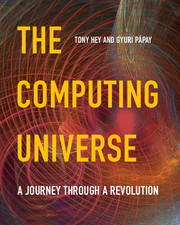Overviews of computer scienceAbelson, Hal, Ledeen, Ken, and Lewis, Harry. Blown to Bits: Your Life, Liberty, and Happiness After the Digital Explosion. Pearson Education, Inc., 2008.
Augarten, Stan. Bit by Bit: An Illustrated History of Computers. Ticknor & Fields, 1984.
Barrett, Neil. The Binary Revolution. Weidenfeld & Nicolson, 2006.
Campbell-Kelly, Martin and Aspray, William. Computer: A History of the Information Machine. Westview Press, 2004.
Harel, David. Algorithmics: The Spirit of Computing. Addison Wesley, 3rd ed., 2004.
Hillis, Daniel. The Pattern on the Stone: The Simple Ideas That Make Computers Work. Basic Books, 1998.
More detailed reading about specific topicsAllen, Paul. Idea Man. Portfolio/Penguin, 2011.
Bell, Gordon and Gemmell, Jim. Total Recall: How the E-Memory Revolution Will Change Everything. Penguin Group USA, 2009.
Berners-Lee, Tim. Weaving the Web. Orion Business Books, 1999.
Ceruzzi, Paul E.. A History of Modern Computing. MIT Press, 1998.
Cook, William J.. In Pursuit of the Traveling Salesman. Princeton University Press, 2012.
Dyson, George. Turing’s Cathedral: The Origins of the Digital Universe. Pantheon Books, 2012.
Feynman, Richard. The Feynman Lectures on Computation, edited by Hey, Tony and Allen, Robin W.. Perseus Books, 2000.
Hafner, Katie and Lyon, Mathew. Where WizardsStay Up Late: The Origins of the Internet. Touchstone, 1998.
Harel, David. Computers Ltd: What They Really Can’t Do. Oxford University Press, 2000.
Hiltzik, Michael. Dealers of Lightning: Xerox PARC and the Dawn of the Computer Age. HarperCollins Publishers, 1999.
Hodges, Andrew. Alan Turing: The Enigma of Intelligence. Unwin Paperbacks, 1983.
Kidder, Tracy. The Soul of a New Machine. Little, Brown and Company, 1981.
MacCormick, John. 9 Algorithms that Changed the Future: The Ingenious Ideas that Drive Today’s Computers. Princeton University Press, 2012.
McGrayne, Sharon Bertsch. The Theory that Would Not Die. Yale University Press, 2011.
Silver, Nate. The Signal and the Noise: Why So Many Predictions Fail – But Some Don’t. Penguin Group USA, 2012.
Stoll, Clifford. The Cuckoo’s Egg. Pan Books, 1991.
Swade, Doron. The Difference Engine: Charles Babbage and the Quest to Build the First Computer. Penguin Books, 2002.
Slater, Robert. Portraits in Silicon. MIT Press, 1987.
Waldrop, Mitchell. The Dream Machine: J. C. R. Licklider and the Revolution that Made Computing Personal. Penguin Group USA, 2002.
Wallace, James and Erickson, Jim. Hard Drive: Bill Gates and the Making of the Microsoft Empire. John Wiley, 1992.





